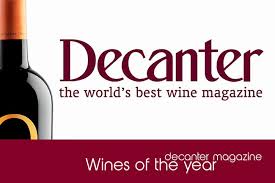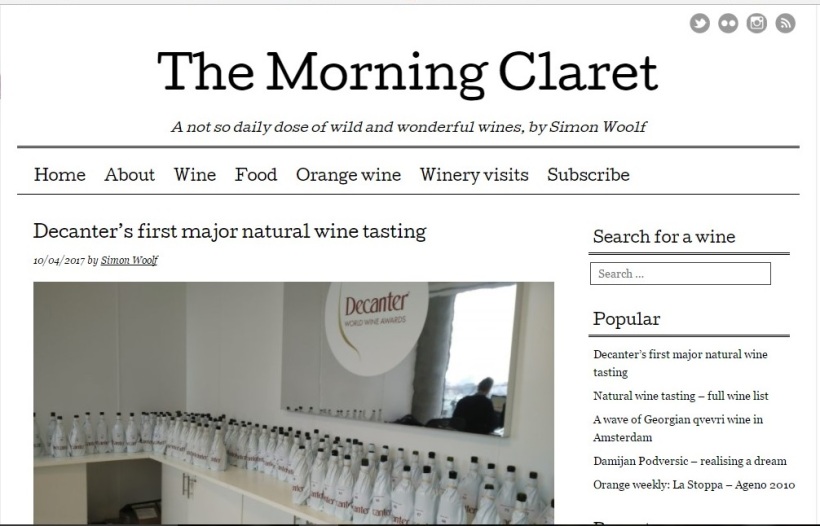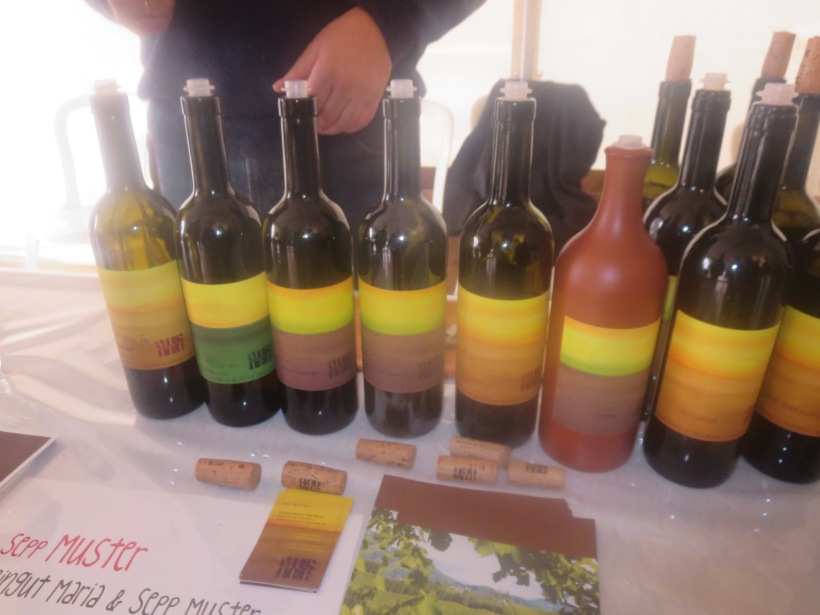
A sign of acceptance in the mainstream wine world? Decanter magazine held its first tasting of natural wines recently. Simon Woolf, Andrew Jefford and Sarah Jane Evans were charged with the tasting and I think that is a very fair minded trio of experienced tasters.
The first issue they faced was how to classify a selection of natural wines and Simon explained on his very good blog themorningclaret.com how they adopted the rules of RAW, the natural wine fairs organised by Isabelle Legeron. That means organic/biodynamic production (preferably certified), hand harvesting, no modern techniques such as reverse osmosis, no fining or filtration and no cultured yeasts. Of course the issue of sulphites was central to discussion, as it so often is, and RAW’s rules allow up to 70mg/l so this tasting allowed the same. When I attended and reported on RAW this spring I made it clear that I view this as too high but that was the rule laid down here.

122 wines were tasted mainly based on bottles provided by UK retailers. Interestingly, and inevitably, the three tasters produced very different results. Being a Decanter tasting they were required to give marks (which I increasingly dislike) but the comments and selections are well worth reading. The results and top ten wines for each of the tasters is available on Simon’s blog here along with a link for a pdf of the Decanter article. The full list of wines tasted is here.
I have obviously been drinking too much wine as I know the vast majority of these 122 bottles. Their top wine turned out to be La Stoppa’s Ageno 2011 and I have praised this domaine before as well as that wine, so no argument from me. My own views would differ from all three but that is the nature of tasting (and why marks make little sense to me). Kreydenweiss, COS, Occhipinti, Haywire, Meinklang, Muster, Sainte-Croix and Testalonga are all firm favourites of mine so, in fact, I would agree with many of the selections.

I highlight this event because I think it is a landmark in that a very conservative magazine (I didn’t renew my subscription many years ago because of its very traditional bias) has brought natural wine on board. I believe natural wine should be willing to accept constructive criticism from such fair minded critics and so this is an important step in the right direction.
Also worth noting is the sheer spread of producers from all corners of the globe, natural wine is not going away it is growing in popularity with consumers and producers. Note too that some big producers are making versions of natural wine, a trend mentioned on these pages before. Whilst I personally may not regard them too sympathetically at least it is a sign that the philosophy behind natural wine is winning support.
So, well done Decanter, and Simon Woolf in particular, for promoting this tasting.

Wonderful wines which definitely pass muster with me

May 3, 2017 at 5:49 pm
I was heartened by this Tasting as well. The Economist may have recently described natural wine as a “fad”, but to wine insiders it is clearly nothing of the sort, even in the UK (which was slower than some other major markets to wake up). Well done Decanter for this Tasting.
I was also heartened by the comments, which seem to remind the detractors that throw away negativity is old hat now. The days of cider-wine are long gone. Such comments are more a reflection on their makers, rather than the wine producers these days.
LikeLiked by 1 person
May 3, 2017 at 6:33 pm
Alan, as you know I have mixed views on natural wine. I’ve had some very good ones (Mas Coutelou, Terre Inconnue etc) and quite a few awful ones. Even the former have, to my tastebuds, a bit of edginess that sometimes I welcome and sometimes don’t. It makes me feel that opening a bottle of natural wine can be a little like playing russian roulette. I’m not sure the movement has necessarily been helped in the UK with its adoption by the hipster London restaurant trade. I’m happy to judge any wine by how it tastes and not how it was made. If less intervention makes a better product that’s fine.
LikeLike
May 4, 2017 at 8:43 am
As ever it’s about the producer Alan. There’s certainly an edge, often higher acidity, which goes well with food. What I would say regarding the UK is that it is not easy to get hold of some of the better producers’ wines. If you think the London restaurant scene has become too hipster then compare to a certain Michelin starred establishment in your hometown where the sommelier told me the region isn’t ready for natural wine, it needs another 2 years. I have no idea what will happen in those 2 years to effect such a transformation! Natural wine is different but many are finding it exciting. My first experiences were a mix of highs and lows for sure, a shock after the 20 years of wine drinking I knew. However, the purity of fruit in Jeff’s wines (yes I’m biased) was what won me over. I like the acidity to balance it, and that’s my taste- some don’t and that is fair enough.
That Andrew Jefford (for me the best wine critic) took part was a real sign that natural wine is merging into the wider wine world. Some will always push the boundaries and won’t want to be part of the mainstream but there are plenty of varieties of natural wine. Seek out a Muster for example and you have some wine which is a perfect expression of grape and place.
LikeLike
May 4, 2017 at 8:26 am
Sums up my view nicely David.
LikeLike
October 14, 2017 at 2:30 am
Great to see natural wines beginning to get some recognition that I think it deserves.
Down here in Australia there has been a steady increase in the availability and production of natural and low intervention wines over the last 5 years or so. Many long time conventional wine drinkers believe it to be a fad, but i think tastings like Decanter’s prove that idea wrong. I think our warmer climate really tends to suit the higher acidity of some natural wines, which I think more and more people are beginning to understand.
Like some of the other comments note, there are some great natural wines available but also some awful ones, but hopefully with more time our natural and minimal intervention wine scene in Australia can begin to refine itself further. I see it as only a good thing for the wine industry and hopefully it will have some conventional wine producers to re evaluate the methods (additives, chemicals, processing aids, etc) they are using to ‘create’ wine.
BA
LikeLike
October 15, 2017 at 5:19 am
Great to see natural wines beginning to get some recognition that I think it deserves. Down here in Australia there has been a steady increase in the availability and production of natural and low intervention wines over the last 5 years or so. Many long time conventional wine drinkers believe it to be a fad, but I think tastings like Decanter’s prove that idea wrong. I think our warmer climate really tends to suit the higher acidity of some natural wines, which I think more and more people are beginning to understand here in Australia. As one of the other comments has noted, there are also some very bad examples of natural wines around, but also some really great ones too!
I also think that the more exposure and recognition that this form of wine making receives, that it will actually benefit the wine industry as a whole. Particularly in regards to how some conventional wines are made with the aid of additives, preservatives etc.
BA
LikeLike
October 15, 2017 at 7:41 am
Thanks for your comments, I apologise for being slow to reply as I was driving from the Languedoc to NE England. I have heard of some of the new wave of Australian natural producers, tasted a few, eg Patrick Sullivan and really enjoyed them. Happily, I’m on my way to find out in person next March/April. I’ll be staying a few days with James Madden a new, natural producer outside Adelaide who worked harvest with us in 2016. I do agree about the climate suiting natural acidity to protect the wines, it’s one reason why the Languedoc has good natural wines. It’s certainly no fad, 20 years plus in France and Italy and growing at a pace. Some of the big commercial companies are trying to ape the wines, new outlets opening and one of the more celebrated UK merchants has just released their first ‘natural’ range. (I am a little sceptical about the latter but will look into it. There are some bad wines, in my view far fewer as growers become more experienced. As ever know your producer! I’m excited about heading your way next year and trying out some new wave wines, meanwhile best wishes.
LikeLiked by 1 person